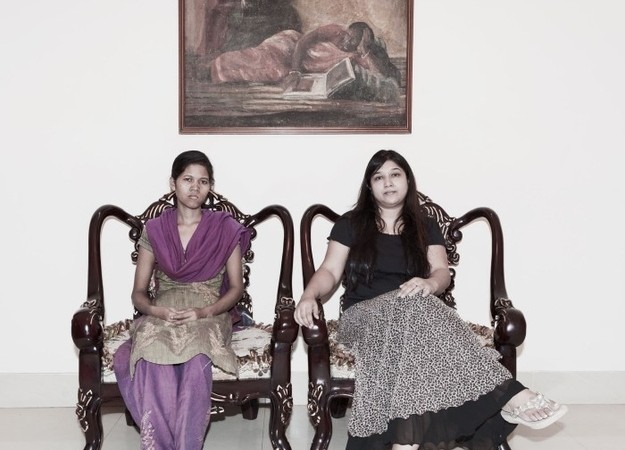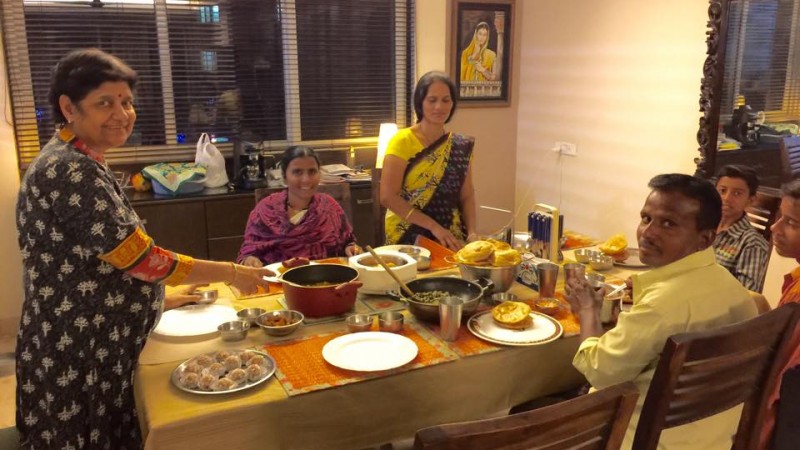 [1]
[1]Child domestic workers are common in India, with the children often being sent by their parents to earn extra money, although it is banned by the government. Image by Biswarup Gangly via Wikimedia Commons. BY-SA 3.0
The Indian sub-continent has a long tradition of households employing house boys or maids. In India alone [2], there are nearly 5 million unskilled people working in the homes of others — most of them women and some underage.
They are usually not entitled to paid holidays, overtime, pensions or other perks like other industrial workers. They have no recognition as a labor force, are paid miserably and are sometimes subjected to domestic abuse [3]. A typical housemaid in India may earn around [4] 6,000 rupees ($90) per month for 10- to 14-hour daily shifts.
Skand Shukla [5] writes in Indian newspaper The Hindu that in most cases the terms and conditions of employment are settled by word of mouth:
The wages, of course, depend on the number of persons in the family, the guests visiting them, the kids in the family, the number of rooms… The remuneration includes, besides the cash, the ‘tyohaari’ [Bakhsish or tips] during [holidays such as] Holi, Deepavali and other occasions.
In some houses, the caste of the employee matters, and those of a lower caste are not treated equally — for example, they are not allowed to sit on the same chairs that family-members use.
Close, yet distant
Jannatul Mawa, a Bangladeshi social activist and documentary photographer, showed this inequality through photography. In her project “Close Distance [6]” she photographed housemaids sitting together with their employer, the disparity between them vivid.
 [6]
[6]Close Distance. The inequality between the housemaid and the employer. Photography by Jannatul Mawa. Used with permission.
 [6]
[6]Close Distance. The inequality between the housemaid and the employer. Photography by Jannatul Mawa. Used with permission.
Mawa writes [6]:
In the society, it is perceived that only women will perform the domestic work which also includes the middle class working women. This household activity is analogous for them although the ‘class’ creates a distance. Every day, maidservants take care of the bed and sofa with their hand but they are neither allowed to sit nor to sleep on them once. With their domestic roles, they are ‘close’ to the middle class women and ‘distant’ at the same time.
See the photo essay here [6].
In India, rights groups and the government [7] are working hard to establish the rights of domestic workers and are pushing agendas to include their service in labour laws. In recent times, it's been up to non-profits like Maid in India [8] and for-profit online job sites or mobile apps to act as intermediaries that ensure the workers receive proper compensation. Concerns abound that a portion of the small salaries that maids receive are deducted by these agencies or intermediaries as service fees which are unregulated.
However, what also needs to change are the attitudes of the households that employ these domestic workers, who due to their poverty, are compelled to accept unequal terms of employment, whether its the job, time or compensation.
‘It doesn't take much to make a big difference in someone's life!’
No wonder spiritual teacher, writer and educator Nithya Shanti [9]‘s Facebook post during this Diwali went viral.
Shanti shared a moment [11] he titled “Why my mother decided to call our maid's family for dinner”. He explained [12]:
Inspired by her friends, my mother started a new tradition in our home last night. She invited the family of our maid Madina to come home for dinner. She had earlier sent dad and me off to buy all the groceries and special food was prepared for them. We all ate together and had a lovely conversation as well.
This is the first time we have ever done anything like this in our family. It felt surreal to see Madina's whole family sitting on our couch and eating with us on our dining table. This was especially significant for me as I remember having bitter arguments with my mother as a kid about why our staff couldn't use the same utensils and furniture as us! It would always end in her crying and then I had to back down. So you can imagine how amazing it was for me to see my mom organise this Diwali dinner on her own initiative. […]
It looks like this is the beginning of a beautiful new tradition in our family, which I hope we will only enhance as time goes on. It touched and opened my heart in many ways. I've asked their son to send me specs of the computer he needs and I'm going to see how we can arrange that for him. It doesn't take much to make a big difference in someone's life!
Read the whole post here [11].
The post was shared by many online media as well, such as Huffington Post [13] and The Logical Indian [14] and has generated much debate online.
Some appreciated the gesture:
Just when you start thinking you live in a stony world & start loosing hope, a story like this pops in to melt… https://t.co/sRIAA6IIkF [15]
— Rajwant Singh (@punjab_express) November 11, 2015 [16]
Now this is how you should celebrate your festivals ! #Respect [17] https://t.co/Me0gvQs73j [18]
— SevenStar Activist (@ChaittanyaKumar) November 10, 2015 [19]
Lakshminarayanan Kolipaka from Madras Christian College commented in The Logical Indian [14]: “happy to see a new trend coming into focus. Hope this will spread.”
There was still much room for change in popular attitudes, however:
This is such crap. Seriously, inviting your house help's family for lunch is news?! https://t.co/PGshGoEyuj [20]
— Radhika Santhanam (@radhikasan) November 11, 2015 [21]
On LinkedIn, Sonjai Kumar [22], a business executive, highlighted another important aspect in the issue of treating maids with respect — household domestic workers in India's metropolitan cities often perform the duty of childcare as well, and in that capacity they influence the current generation of kids:
Maids have become a driving force of today’s generation life style and difficult to imagine life without them. It can be said that in today’s generation, maids are driving the current corporate in India where female workforce participation are quite substantial.
